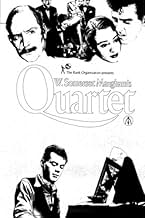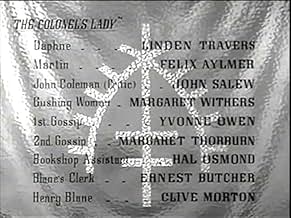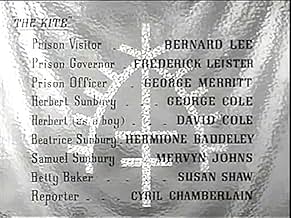Four of W. Somerset Maugham's short stories are brought to the screen with each introduced by the author. In "The Facts of Life", a young man with great potential on the tennis courts goes t... Read allFour of W. Somerset Maugham's short stories are brought to the screen with each introduced by the author. In "The Facts of Life", a young man with great potential on the tennis courts goes to Monte Carlo and ends up doing the exact opposite of what his father recommended. In "The... Read allFour of W. Somerset Maugham's short stories are brought to the screen with each introduced by the author. In "The Facts of Life", a young man with great potential on the tennis courts goes to Monte Carlo and ends up doing the exact opposite of what his father recommended. In "The Alien Corn", an aspiring pianist devotes himself to perfecting his artistic skills, but f... Read all
- Awards
- 2 wins total
Featured reviews
W. Somerset Maugham was one of Great Britain's last great, subtle story tellers, a master of the ironic and quiet wisdom. Late in a long career he had substantial success with three films tied to successful books of his classic short stories - of which QUARTET was the first. In it, Maugham provided an introduction to the collection and a brief exegesis or afterward. In the subsequent films, TRIO (1950) and ENCORE (1951), the film makers improved the experience by having Maugham provide a brief introduction to each of the three stories - reduced from QUARTET's four.
The four works dramatized in QUARTET are given perfect, polished productions with appropriate stars of the British stage and screen, only a few of which will be familiar to American eyes - most notably Dirk Bogarde as the hopeful pianist in the strangely undercut (by the screenwriter's removing Maugham's ethnic subtext) "Alien Corn," the movie's second act, and Honor Blackman as his girlfriend. The stories themselves are quiet, literate and well worthwhile, but hardly the sort of thing to set the pulse racing. More the sort of thing to set the MIND racing. They well reflect the sort of sensibility, such as which Maugham brought to his best plays like THE CONSTANT WIFE, THE CIRCLE or THE LETTER.
Maugham's three anthologies were successful enough that a decade later his works were again tapped for a successful three year run of an hour long television anthology ("The Somerset Maugham Hour") in which all four of these stories would be recycled along with several of those from the film sequels.
Hard to find at present in the U.S. aside from occasional screenings on cable services like Turner Classic Movies, the films have been reissued on British DVDs and are well worth seeking out for good, literate viewing. Some of these four (the concluding "Colonel's Lady" in which a Col. Blimp-type, startled to find his wife of many years has written a best selling book of poetry recalling a great love affair is consumed with jealousy for the unknown lover) are legitimate classics, some ("Alien Corn" in which 'reasonable' solutions to personal passion are found wanting or "The Kite" in which a young wife nearly destroys her marriage through a conventional concern with her own image and refusal to understand her husband's passion) have been copied so frequently they risk feeling almost trite and some ("The Facts of Life" in which a young man finds his father's advice not infallible) are so quietly humorous that it is easy to miss Maugham's more serious point, but all are quiet gems, polished to a nice soft glow.
The Entire Maugham trilogy (QUARTET, TRIO and ENCORE) is well worth your time if you don't need car chases and explosions to hold your interest.
The second story, starring Dirk Bogarde, is also a bit unbelievable, and also a bit tragic. How tragic is it to not be good at the thing you love? After two stories about wealthy sons, Maugham writies "The Kite". in which he tries to aim for the Middle Class and the usual mother-in-law-wife tug of war. The story is a bit banal, but because of the author, we view it with greater meaning.
The best, however, is last. "The Colonel's Lady" is not about his mistress; it is about his wife. This short story is the type of writing that only Maugham and very few others are capable of creating. It is touching, incisive, and heartfelt. To be able to accomplish so much in such a short time is truly amazing. These stories, and particularly the last one, are not to be missed.
A set of four half-hour movies built on stories by Somerset Maugham, who also introduces the movie. They all have a witty naturalism that's totally likable, and the slice of life insights are sometimes even moving. You can only get so far into complexity in a short time, but these do well at packing their narrative efficiently. Really enjoyable. And, especially for those of us who aren't British, they are a total insight into British life (mostly upper class British life, for sure, and mostly post-war era).
It's hard to go into them all in detail but I'll point out the key thing to each that makes them watchable. I'm not talking plot, but some other quality. As follows.
The Facts of Life: The most fun might be the first, logically placed. A man is given advice by his father before going to Monte Carlo (that rich person's den of temptation). And things go exactly backwards, without the son really having a thing to do with it. You mostly smile and enjoy the ride.
The Alien Corn: More straightforward (except the title), and reveals a common Maugham theme of getting the practical British old folks to appreciate an artist's sensibility. In this case it's music. And it runs into a shocking final chord. Idealism up against the wall.
The Kite: Really a tale of a marriage that comes unhinged on one basic misunderstanding. Both main characters (man and wife) are stubborn about certain principles, and it comes to a rather simple kind of violence between them. And a resolution. Touching.
The Colonel's Lady: Certainly more touching, a funny and brilliant and sad bit of writing and stunning acting. This is probably the most involved of the group, and it's just tightly made, a short story in feel, and yet with enough layers to make it really lasting.
All of these are about real life and real people, and small things that end up mattering quite a lot. It's a different experience than a single feature movie, yes, but a refreshing one, with built in refreshment breaks. If you like this approach (sort movies in group), check out the Maugham inspired sequel of sorts called "Encore."
Did you know
- TriviaThe symbol on the title page of each story is a W. Somerset Maugham superstition. Copied by his father on a trip to Africa, it is a Moorish symbol to bring good luck and ward off the evil eye. Maugham had it printed in his fourth novel, but unfortunately upside-down and the book flopped. Printed correctly on subsequent books, he became a best-selling author and had the motif reproduced everywhere, including his Riviera house, Villa La Mauresque.
- Quotes
W. Somerset Maugham - Host: In my twenties, the critics said I was brutal. In my thirties, they said I was flippant; in my forties, they said I was cynical; in my fifties they said I was competent - and then, in my sixties, they said I was superficial.
- ConnectionsFeatured in Raiders of the Lost Archive: Episode #1.3 (2009)
- SoundtracksAlouette
(uncredited)
French Canadian Traditional
Sung by all in the Cabaret room in "Facts of Life" segment
- How long is Quartet?Powered by Alexa
Details
- Release date
- Country of origin
- Language
- Also known as
- Quartett
- Filming locations
- Gainsborough Studios, Islington, London, England, UK(studio: made at Gainsborough Studios, London, England.)
- Production company
- See more company credits at IMDbPro
- Runtime
- 2h(120 min)
- Color
- Aspect ratio
- 1.37 : 1




































